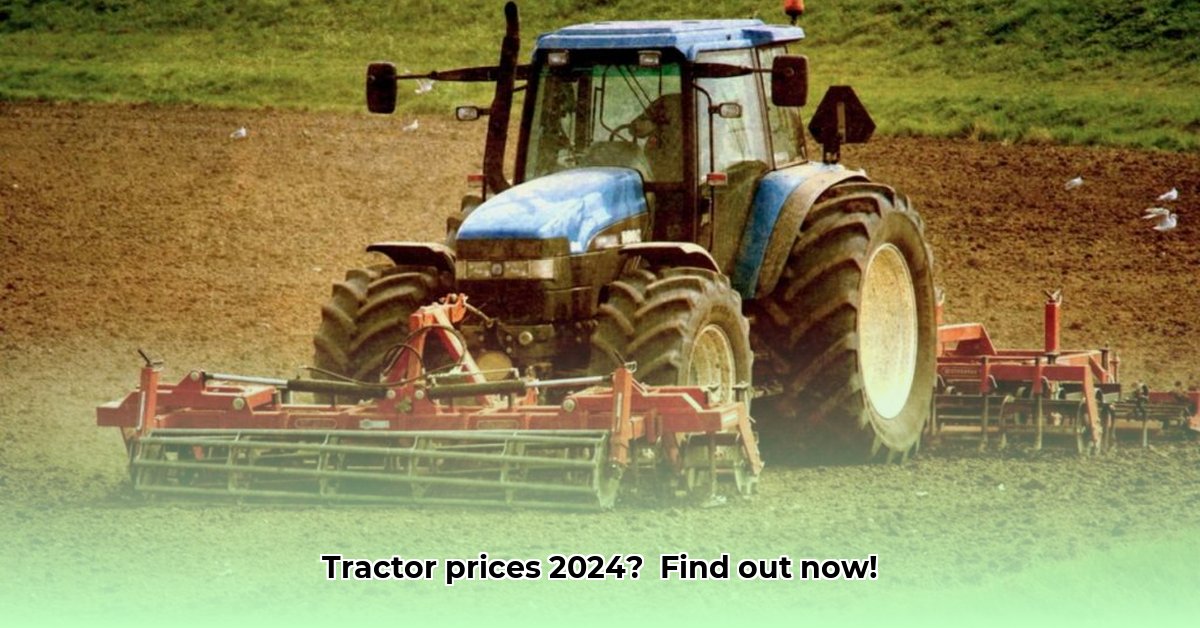
Buying a farm tractor is a significant investment. This comprehensive guide clarifies the cost of tractors in 2024, factoring in various elements crucial for informed decision-making. We'll explore new and used tractor prices, influential factors, and steps for a successful purchase. For additional cost insights, check out this helpful resource on tractor rental costs.
Tractor Prices: A Wide Range
Tractor costs vary significantly depending on your needs. A small, compact tractor suitable for hobby farms or small acreages can cost under $10,000. Conversely, large, high-powered tractors for extensive operations may exceed $600,000. Horsepower is a major price driver; it's analogous to comparing a motorcycle to a semi-truck – vastly different power (and cost). Isn't it important to understand this range before starting your search?
Factors Affecting Tractor Costs
Several factors influence the price:
- Horsepower: Higher horsepower equates to greater capability and a higher price.
- Brand Reputation: Established brands often command premium prices reflecting their reliability and support.
- Age and Hours of Use: A new tractor with low hours will cost significantly more than a used one. Thorough inspection is crucial for used purchases.
- Additional Attachments: Features like front loaders, backhoes, or specialized implements significantly increase the total cost. Do you really need all the bells and whistles, or would a more basic model suffice?
New vs. Used Tractors: Weighing the Options
The choice between a new and used tractor involves tradeoffs. New tractors offer warranties and the latest technology but come at a higher price. Used tractors present a more affordable option but carry risks; a comprehensive inspection by a qualified mechanic is strongly recommended. This is a critical decision point – which better aligns with your budget and risk tolerance?
Determining the Right Tractor for Your Farm
Before focusing on price, assess your farm's size, crops, and land coverage. This determination directly impacts the required horsepower and features, preventing overspending on unnecessary capabilities. Efficient planning saves money in the long run. What's your farm's unique profile, and how does it dictate your tractor needs?
Financing Your Tractor Purchase
Financing or leasing is common for new tractors. Shop around for favorable interest rates and terms, carefully reviewing the agreement before signing. A clear understanding of financing terms is paramount in navigating this significant investment. Have you researched various financing options to secure the best deal?
High-Tech Tractors: The ROI Question
Modern tractors incorporate GPS guidance, automatic steering, and other technologies for increased efficiency and yields. However, this technology adds to the upfront cost. The return on investment (ROI) needs careful evaluation, considering the size and type of your operation. High-tech features may yield significant ROI for large commercial operations, but the same might not hold for smaller farms. Is the high-tech investment justifiable for your specific operation?
Future Tractor Price Trends
Several external forces could influence future tractor prices: ongoing technological advancements, stricter environmental regulations, and evolving safety standards. Staying informed about these trends is important for long-term planning. How will these external factors shape your future tractor purchase decision?
Steps to Buying a Tractor
- Assess Your Needs: Define your farm's specific requirements and scale.
- Research Tractor Models: Explore various brands and models based on horsepower and desired features.
- Set a Budget: Determine a realistic and sustainable price range.
- Compare New vs. Used: Weigh the benefits of each option, considering warranties and potential risks.
- Secure Financing: Explore and compare different financing or leasing options.
- Thorough Inspection: For used tractors, employ a qualified mechanic for a thorough inspection.
- Factor in Attachments: Account for the cost of necessary tools and implements.
Risk Assessment Matrix
| Risk Factor | Mitigation Strategy |
|---|---|
| High Initial Cost | Explore financing, leasing, or consider a used tractor. |
| Obsolescence of Older Models | Prioritize regular maintenance and plan for necessary upgrades. |
| Parts Availability | Establish relationships with reliable parts suppliers. |
| Complex Technology | Seek training or utilize dealer support as needed. |
| Fuel Cost Fluctuations | Explore strategies to improve fuel efficiency. |
Buying a tractor is a substantial investment. Thorough planning, research, and careful consideration of all these factors will help you choose the right tractor for your farm without overspending. Remember, making a well-informed decision is key to a successful and profitable operation.
Dr. Anya Sharma, Agricultural Economist, University of California, Davis, advises, "Thorough due diligence is crucial. Don’t rush the process. Consider your long-term needs as well as your current situation."